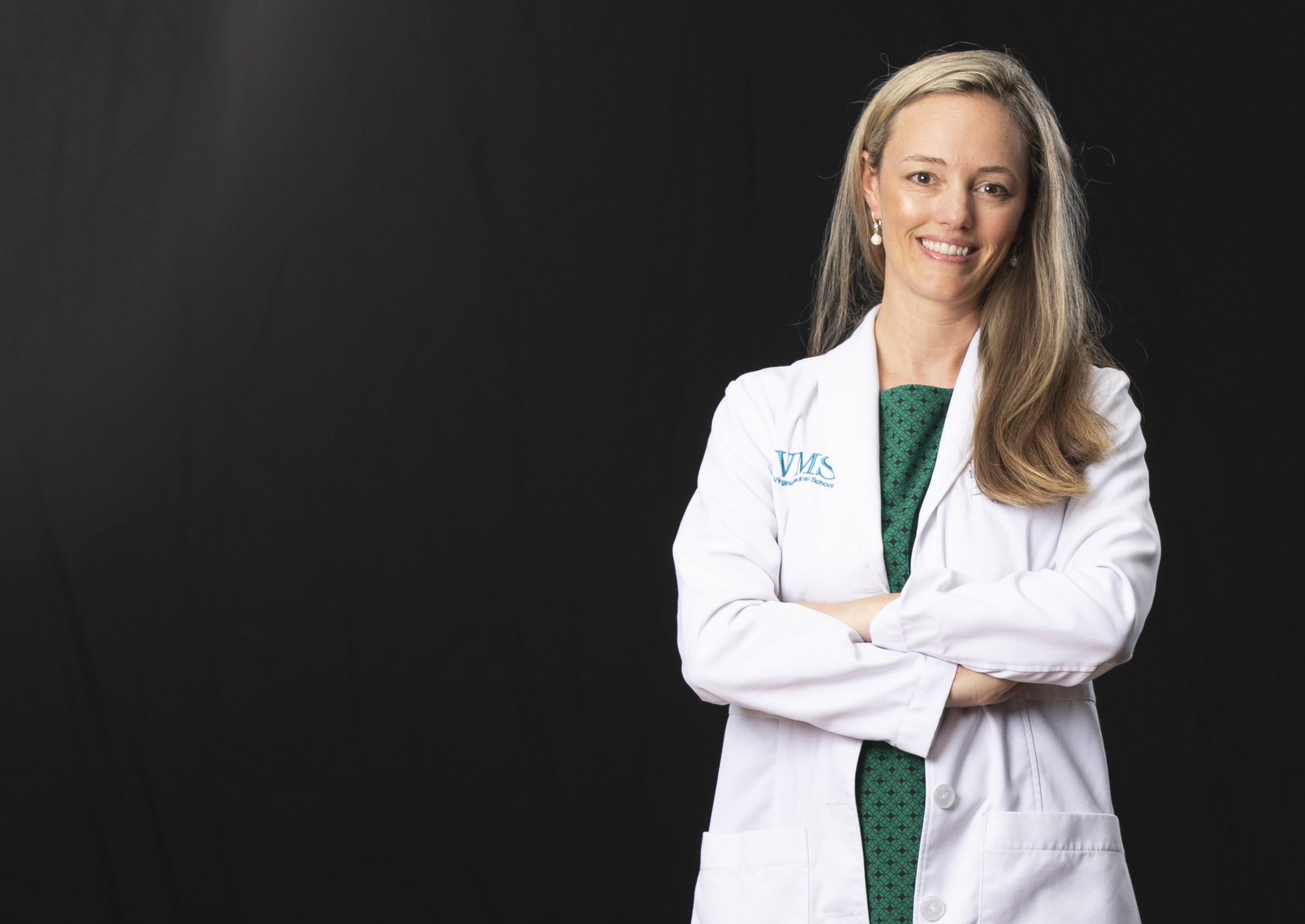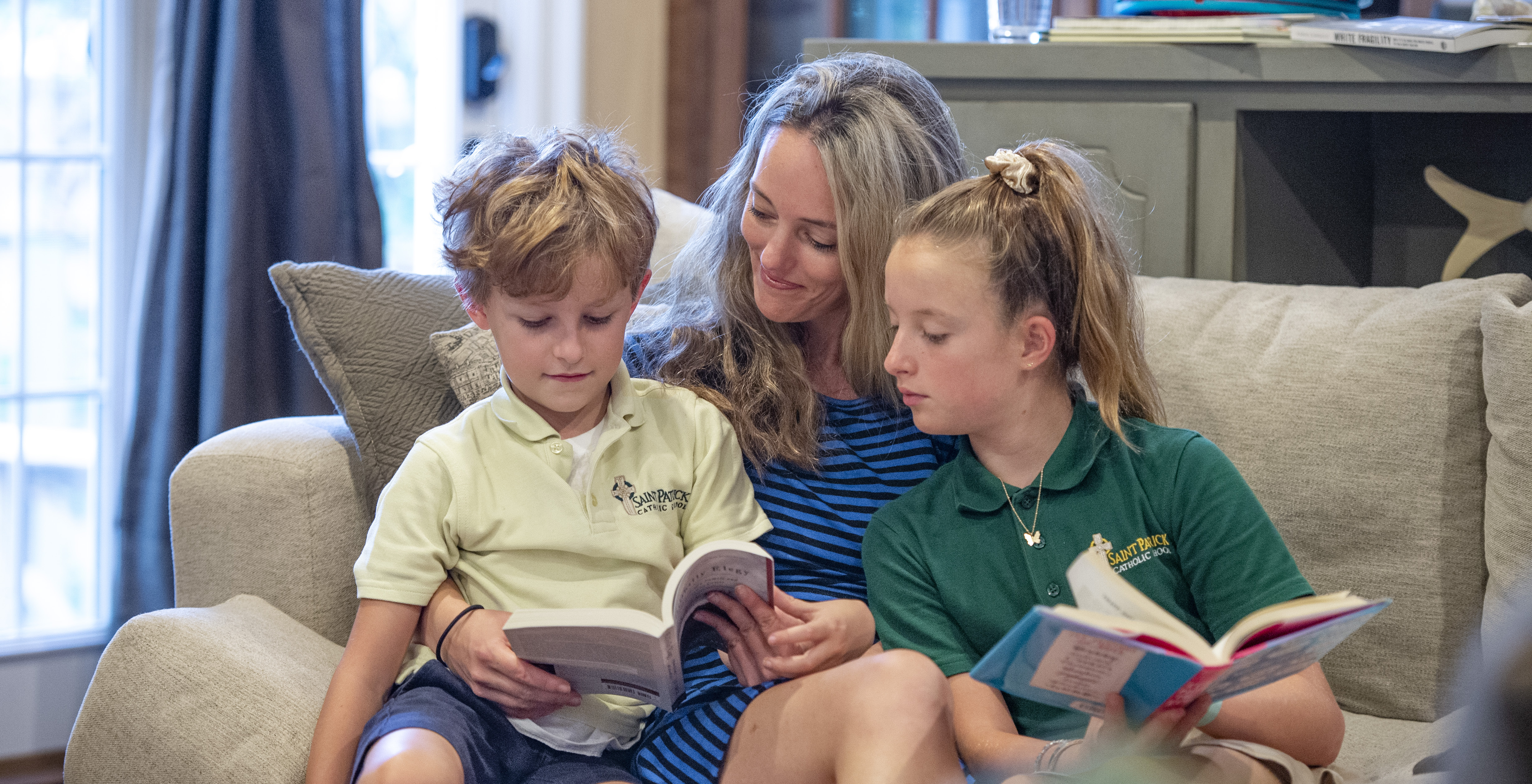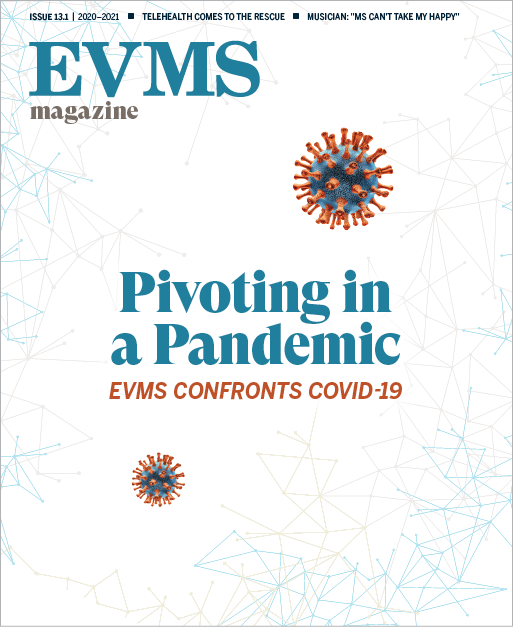
When she arrived at EVMS four years ago, A. Brooke Hooper, MD, jumped in with both feet. Today among her many titles are Associate Dean for Clinical Education and Associate Professor of Internal Medicine. The former Navy physician also volunteers with community organizations and is married with three children.
Q. You grew up in a military family, and before you joined EVMS, you were a Navy physician at Naval Medical Center Portsmouth (NMCP). When you transitioned from active duty, why did you choose to continue your career at EVMS?
A. Being part of the military community by serving in the U.S. Navy has been one of the most fulfilling experiences of my life and certainly has been the most impactful in shaping who I am today. Transitioning from the military was interesting because it was one of my only life transitions when I was able to choose my geographic location.
The EVMS missions of service, commitment to the community and education aligned well with what I enjoyed most about active-duty service. I had the privilege of working with EVMS students for five years prior to becoming an EVMS faculty member, so I was well aware of the high level of professionalism, communication and compassion that EVMS students bring to patient care.
Staying in Hampton Roads also allowed me to stay engaged with a diverse community, a wonderful neighborhood and an incredible group of friends, including EVMS and NMCP colleagues.
Q. How does your experience in the military benefit what you do at EVMS?
A. Serving in the military allowed sacrifice to a purpose bigger than myself, embracing the unexpected path and listening intently to the stories of people of various cultures and backgrounds. These are the experiences that drew me to my current career as an educator and Internal Medicine physician.
As a military physician, I had the privilege of being surrounded by mentors and sponsors that helped steer me to leadership positions and helped me develop professionally and personally. I have found this at EVMS as well, and I try to pay this forward for my students, residents and colleagues whenever I can.

Q. You wear several hats here, including Associate Dean for Clinical Education, Associate Professor of Internal Medicine, director of several medical education programs, provider with the Sentara Ambulatory Care Clinic and faculty leader of the EVMS chapter of the American Medical Women’s Association (AMWA), among others. Is there work you do here that’s especially meaningful for you?
A. Patient care will always be the most meaningful part of my job. I have degrees in molecular biology and art history, and I completed residencies in internal medicine and pediatrics, so in addition to enjoying the complexity and art of medicine, I enjoy learning about the whole picture of a patient and their story. I enjoy using creativity and compassion to come up with unique, personalized solutions and treatments that are ideal for a particular patient.
Mentoring students and residents as they first experience the privilege of being invited into patients’ lives is tremendously rewarding. The pride that I feel when one of my former students or residents does incredible things or excels in their career is indescribable. I hope that I am having an impact on medical education through my work with students, residents and organizations, such as AMWA. I support creating a learning environment where all are welcomed and treated with respect, empathy and compassion.
Q. You’re also known in the surrounding community for volunteering with several organizations. Why is that important to you?
A. I believe that the role of a physician includes being engaged in the community. The most interesting volunteer work that I have done was with my neighborhood civic league. I enjoyed learning about city council and meeting my neighbors. I also enjoy volunteering with my church and with my children’s school.
Q. About three years ago, EVMS Magazine published the cover story “Wonder Women,” in which we showcased the EVMS leaders who were breaking barriers and mentoring the next generation of women in science and medicine. You were one of those women. What kind of challenges, if any, have you experienced as a woman in medicine?
I have seen women rock amazing careers, families and children and serve their communities locally and internationally in all areas of science and all specialties in medicine …
A. My medical school class was the first in the history of Vanderbilt School of Medicine where the number of women exceeded men, and I have been lucky to be surrounded by powerful female role models, friends and mentors throughout my career. I also have an incredible physician spouse who supports my career, home and children with equal responsibility in every area. The greatest challenge I face as a physician-mother is ignoring the concept of “work-life balance” and accepting every day that I am the best mother, best physician, best educator and best colleague that I could be on that particular day and that some days I do better in one area than another.
Q. What guidance would you offer young women pursuing careers in science and medicine today?
A. I have seen women rock amazing careers, families and children and serve their communities locally and internationally in all areas of science and all specialties in medicine — just take a look at my inspiring colleagues and role models in the “Wonder Women” story. There is no “right time,” “length of training” or “best career” for being a woman in science and medicine — just do what you are most passionate about. I have seen every type of career in science and medicine work beautifully for women with families and with children; this should never stop you from following a passion.
We need more female leaders in science and medicine. Sheryl Sandberg [co-author of “Lean In: Women, Work, and the Will to Lead”] likely changed my entire career trajectory when I followed her advice to always take a seat at the table and not apologize for taking up space. Imposter syndrome is real, and I think especially for women. Ask for positions and opportunities that interest you, even if you think you aren’t “ready.”

Q. In what little free time you have, what hobbies or interests do you pursue? How do you relax?
A. I enjoy museums and the theatre, and I have always been an avid reader. I read around 30 to 40 books a year. There is something about being immersed in the perspective of seeing life through someone else’s interpretation that I deeply enjoy. Lately it has been fun to share this interest with my 10-year-old daughter.
Also, I have a very athletic family who keep me very active. We are always on the go — camping, hiking, biking or spending time at the pool or on the ocean swimming, boating, sailing and paddle boarding.
Q. In what ways has the COVID-19 pandemic affected the work you do at EVMS? Do you see anything positive related to medical education or patient care coming out of the pandemic?
A. The EVMS community has been extremely collaborative, innovative and resilient in the face of the many challenges brought by the COVID-19 pandemic.
The COVID-19 pandemic expedited the acceptance of telehealth by patients and physicians alike. The telehealth program that I spearheaded at the Sentara Ambulatory Care Clinic as a result of COVID-19 is a model that will likely continue beyond the COVID-19 pandemic and will have a positive impact on patients even beyond the current crisis.
I think that the development of high-quality, collaborative distance-learning experiences and required education in the delivery of telehealth will arm students with critical skills in the rapidly evolving realm of healthcare technology and delivery. Students are learning the skills of flexibility and resilience in the face of uncertainty that will equip them to be the physician leaders of tomorrow with the ability to respond to the inevitable crises of the future.












